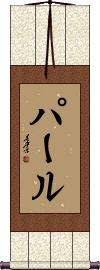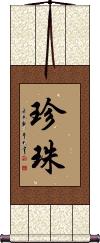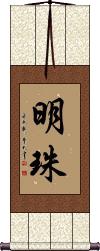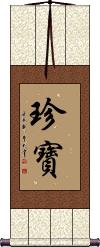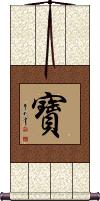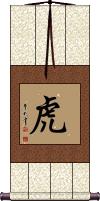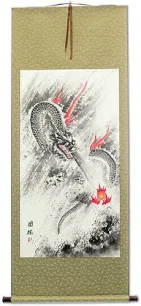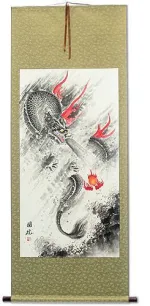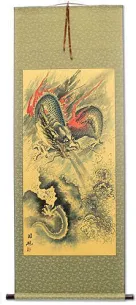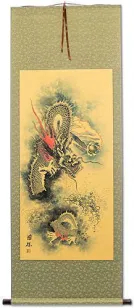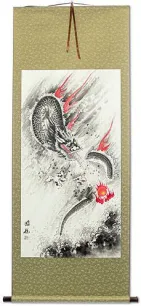Many custom options...
And formats...

Pearl in Chinese / Japanese...
Buy a Pearl calligraphy wall scroll here!
Personalize your custom “Pearl” project by clicking the button next to your favorite “Pearl” title below...
Pearl
Pearl
Bright Pearl
This means bright pearl or jewel of great value.
明珠 is a female given name Mingzhu in Chinese or Meishu in Japanese.
Pearl in the Palm
Treasure
In Chinese, 珍寶 means treasure, something you value highly, or something very precious to you.
In Japanese, 珍寶 has a meaning like “rare treasure.”
珍 can mean a precious thing or treasure. 寶 can mean a jewel or gem, a treasure, or simply precious. Together these two characters reinforce each other into a word that clearly means treasure.
Treasure
寶 means precious thing or treasure.
This can also mean precious, a gem, a pearl, or anything valuable.
![]() The version of this character shown to the left is the traditional Chinese and ancient/traditional Japanese version. In modern Japan and China, this character has been simplified. This simplified version is shown to the right. If you want this modern Japanese/simplified version, just click the Kanji on the right, instead of the button above. If your audience is Chinese or Korean, I recommend the ancient/traditional form. Only consider the simplified form if your audience is younger Japanese people.
The version of this character shown to the left is the traditional Chinese and ancient/traditional Japanese version. In modern Japan and China, this character has been simplified. This simplified version is shown to the right. If you want this modern Japanese/simplified version, just click the Kanji on the right, instead of the button above. If your audience is Chinese or Korean, I recommend the ancient/traditional form. Only consider the simplified form if your audience is younger Japanese people.
Tiger
Year of the Tiger / Zodiac Sign
虎 is the character for tiger in Chinese, old Korean Hanja, and Japanese Kanji.
Since you already know what a tiger is, here's some trivia: If you look at the Japanese pronunciation, you might remember a movie called “Tora Tora Tora” which was the code word used to initiate the attack on Pearl Harbor. It simply means “Tiger Tiger Tiger.”
In Chinese culture, the tiger is considered to be the king of all animals (in much the way we see the lion in western culture).
From the Chinese Zodiac, if you were born in the year of the tiger, you . . .
Have a strong personality.
Are full of self-confidence.
Love adventure
Don't like to obey others.
See also our Chinese Zodiac or Tiger Calligraphy pages.
This in-stock artwork might be what you are looking for, and ships right away...
Gallery Price: $300.00
Your Price: $138.88
Gallery Price: $300.00
Your Price: $138.88
Gallery Price: $240.00
Your Price: $138.88
Gallery Price: $240.00
Your Price: $138.88
Gallery Price: $240.00
Your Price: $138.88
These search terms might be related to Pearl:
Gem
Precious / Treasure
Protect Guard Treasure Cherish
Treasure
Not the results for Pearl that you were looking for?
Below are some entries from our dictionary that may match your Pearl search...
| Characters If shown, 2nd row is Simp. Chinese |
Pronunciation Romanization |
Simple Dictionary Definition |
寶 宝 see styles |
bǎo bao3 pao takara たから |
More info & calligraphy: Treasuretreasure; (surname) Takara ratna, precious, a treasure, gem, pearl, anything valuable; for saptaratna v. 七寶. Also maṇi, a pearl, gem. |
明珠 see styles |
míng zhū ming2 zhu1 ming chu meishu / meshu めいしゅ |
More info & calligraphy: Bright Pearl(given name) Meishu bright pearl |
珍寶 珍宝 see styles |
zhēn bǎo zhen1 bao3 chen pao chinbō |
More info & calligraphy: TreasureA pearl; jewel; precious thing. |
珍珠 see styles |
zhēn zhū zhen1 zhu1 chen chu chizu ちず |
More info & calligraphy: Pearl(surname) Chizu |
觀世音 观世音 see styles |
guān shì yīn guan1 shi4 yin1 kuan shih yin Kanzeon かんぜおん |
More info & calligraphy: Guan Shi Yin: Protector Of Life(out-dated kanji) Avalokiteshvara (Bodhisattva); Avalokitesvara; Kannon; Kwannon; Guanyin; Buddhist deity of compassion Regarder of the world's sounds, or cries, the so-called Goddess of Mercy; also known as 觀音; 觀世音善薩; 觀自在 (觀世自在); 觀尹; 光世音 (the last being the older form). Avalokiteśvara, v. 阿 8. Originally represented as a male, the images are now generally those of a female figure. The meaning of the term is in doubt; it is intp. as above, but the term 觀自在 (觀世自在) accords with the idea of Sovereign Regarder and is not associated with sounds or cries. Guanyin is one of the triad of Amida, is represented on his left, and is also represented as crowned with Amida; but there are as many as thirty-three different forms of Guanyin, sometimes with a bird, a vase, a willow wand, a pearl, a 'thousand' eyes and hands, etc., and, when as bestower of children, carrying a child. The island of Putuo (Potala) is the chief centre of Guanyin worship, where she is the protector of all in distress, especially of those who go to sea. There are many sūtras, etc., devoted to the cult, but its provenance and the date of its introduction to China are still in doubt. Chapter 25 of the Lotus Sūtra is devoted to Guanyin, and is the principal scripture of the cult; its date is uncertain. Guanyin is sometimes confounded with Amitābha and Maitreya. She is said to be the daughter of king Śubhavyūha 妙莊王, who had her killed by 'stifling because the sword of the executioner broke without hurting her. Her spirit went to hell; but hell changed into paradise. Yama sent her back to life to save his hell, when she was miraculously transported on a Lotus flower to the island of Poo-too'. Eitel. |
掌上明珠 see styles |
zhǎng shàng míng zhū zhang3 shang4 ming2 zhu1 chang shang ming chu |
More info & calligraphy: Pearl in the Palm |
核 see styles |
hé he2 ho kaku かく |
pit; stone; nucleus; nuclear; to examine; to check; to verify (1) stone (of a fruit); pit; pip; (2) core (of an organization, team, etc.); nucleus; heart; (noun - becomes adjective with の) (3) (See 核兵器) nuclear weapons; (4) {physics} (See 原子核) nucleus (of an atom); (5) {biol} (See 細胞核) nucleus (of a cell); (6) {met} (See 凝結核) condensation nucleus; (7) {astron} (planetary) core; (8) {chem} ring (in a cyclic compound); (9) {math} kernel; core; (10) nucleus (of a cultured pearl); (surname) Sane kernel |
玥 see styles |
yuè yue4 yüeh |
pearl used in sacrifice |
玭 see styles |
pín pin2 p`in pin |
pearl |
珠 see styles |
zhū zhu1 chu megumi めぐみ |
bead; pearl; CL:粒[li4],顆|颗[ke1] (1) ball; sphere; globe; orb; (2) bead (of sweat, dew, etc.); drop; droplet; (3) ball (in sports); (4) pile (of noodles, etc.); (5) bullet; (6) bulb (i.e. a light bulb); (7) lens (of glasses, etc.); (8) bead (of an abacus); (9) (slang) (abbreviation) ball (i.e. a testicle); (10) gem; jewel (esp. spherical; sometimes used figuratively); pearl; (11) female entertainer (e.g. a geisha); (12) (derogatory term) person (when commenting on their nature); character; (13) item, funds or person used as part of a plot; (n,n-suf) (14) egg; (suffix noun) (15) coin; (16) precious; beautiful; excellent; (female given name) Megumi mani. A pearl; a bead; synonym for buddha-truth. |
珥 see styles |
ěr er3 erh |
pearl or jade earring |
珧 see styles |
yáo yao2 yao |
mother-of-pearl |
珹 see styles |
chéng cheng2 ch`eng cheng |
a kind of jade; a kind of pearl |
瑤 瑶 see styles |
yáo yao2 yao you / yo よう |
jade; precious stone; mother-of-pearl; nacre; precious; used a complementary honorific (female given name) Yō Jasper (green), green crystal. |
璣 玑 see styles |
jī ji1 chi |
irregular pearl |
璸 see styles |
bīn bin1 pin |
(pearl) |
蠙 𧏖 see styles |
bīn bin1 pin |
pearl-oyster |
七寶 七宝 see styles |
qī bǎo qi1 bao3 ch`i pao chi pao shichihō |
sapta ratna 薩不荅羅的捺 The seven treasures, or precious things, of which there are varying descriptions, e.g. 金 suvarna, gold; 銀rūpya, silver; 鐂璃 vaiḍūrya, lapis lazuli; 玻瓈sphaṭika, crystal; 硨磲 musāragalva, agate; 赤珠 rohita-mukta, rubies or red pearls; 瑪瑙 aśmagarbha, cornelian. Also the seven royal (cakravartin) treasures―the golden wheel; elephants; dark swift horses; the divine pearl, or beautiful pearls; able ministers of the Treasury; jewels of women; and loyal generals. |
信珠 see styles |
xìn zhū xin4 zhu1 hsin chu shinshu |
The pearl of faith; as faith purifies the hear it is likened to a pearl of the purest water. |
六輪 六轮 see styles |
liù lún liu4 lun2 liu lun rokuwa ろくわ |
(place-name) Rokuwa The six kinds of cakravartī, or wheel-kings, each allotted to one of the 六位; the iron-wheel king to the 十信位, copper 十住, silver 十行, gold 十廻向, crystal 十地, and pearl 等覺. |
刹海 see styles |
chà hǎi cha4 hai3 ch`a hai cha hai sekkai |
Land and sea. The flagpole of a monastery, surmounted by a gilt ball or pearl, symbolical of Buddhism; inferentially a monastery with its land. Also 刹柱, 金刹 (or 表刹). |
地藏 see styles |
dì zàng di4 zang4 ti tsang jizou / jizo じぞう |
Kṣitigarbha, the Bodhisattva of the Great Vow (to save all souls before accepting Bodhi); also translated Earth Treasury, Earth Womb, or Earth Store Bodhisattva (surname) Jizou Ti-tsang, J. Jizō, Kṣitigarbha, 乞叉底蘗沙; Earth-store, Earth-treasury, or Earthwomb. One of the group of eight Dhvani- Bodhisattvas. With hints of a feminine origin, he is now the guardian of the earth. Though associated with Yama as overlord, and with the dead and the hells, his role is that of saviour. Depicted with the alarum staff with its six rings, he is accredited with power over the hells and is devoted to the saving of all creatures between the nirvana of Śākyamuni and the advent of Maitreya the fifth century he has been especially considered as the deliverer from the hells. His central place in China is at Chiu-hua-shan, forty li south-west of Ch'ing-yang in Anhui. In Japan he is also the protector of travellers by land and his image accordingly appears on the roads; bereaved parents put stones by his images to seek his aid in relieving the labours of their dead in the task of piling stones on the banks of the Buddhist Styx; he also helps women in labour. He is described as holding a place between the gods and men on the one hand and the hells on the other for saving all in distress; some say he is an incarnation of Yama. At dawn he sits immobile on the earth 地 and meditates on the myriads of its beings 藏. When represented as a monk, it may be through the influence of a Korean monk who is considered to be his incarnation, and who came to China in 653 and died in 728 at the age of 99 after residing at Chiu-hua-shan for seventy-five years: his body, not decaying, is said to have been gilded over and became an object of worship. Many have confused 眞羅 part of Korea with 暹羅 Siam. There are other developments of Ti-tsang, such as the 六地藏 Six Ti-tsang, i. e. severally converting or transforming those in the hells, pretas, animals, asuras, men, and the devas; these six Ti-tsang have different images and symbols. Ti-tsang has also six messengers 六使者: Yama for transforming those in hell; the pearl-holder for pretas; the strong one or animals; the devīof mercy for asuras; the devī of the treasure for human beings; one who has charge of the heavens for the devas. There is also the 延命地藏 Yanming Ti-tsang, who controls length of days and who is approached, as also may be P'u-hsien, for that Purpose; his two assistants are the Supervisors of good and evil 掌善 and 掌惡. Under another form, as 勝軍地藏 Ti-tsang is chiefly associated with the esoteric cult. The benefits derived from his worship are many, some say ten, others say twenty-eight. His vows are contained in the 地藏菩薩本願經. There is also the 大乘大集地藏十電經 tr. by Xuanzang in 10 juan in the seventh century, which probably influenced the spread of the Ti-tsang cult. |
大意 see styles |
dà yi da4 yi5 ta i taii / tai たいい |
careless synopsis; precis; summary; gist; outline; (personal name) Masamoto The general meaning or summary of a sutra or śāstra. Also, the name of a youth, a former incarnation of the Buddha : to save his nation from their poverty, he plunged into the sea to obtain a valuable pearl from the sea-god who, alarmed by the aid rendered by Indra, gave up the pearl ; v. 大意經. |
寶珠 宝珠 see styles |
bǎo zhū bao3 zhu1 pao chu houju / hoju ほうじゅ |
(surname) Houju maṇi, a precious pearl, or gem; a talisman; a symbol of Śāriputra. |
尸羅 尸罗 see styles |
shī luó shi1 luo2 shih lo shira |
sila (Buddhism) Sila, 尸; 尸怛羅 intp. by 淸凉 pure and cool, i.e. chaste; also by 戒 restraint, or keeping the commandments; also by 性善 of good disposition. It is the second pāramitā, moral purity, i. e. of thought, word, and deed. The four conditions of śīla are chaste, calm, quiet, extinguished, i. e. no longer perturbed by the passions. Also, perhaps śīla, a stone, i. e. a precious stone, pearl, or coral. For the ten śīlas or commandments v. 十戒, the first five, or pañca-śīla 五戒, are for all Buddhists. |
摩尼 see styles |
mó ní mo2 ni2 mo ni mani まに |
Mani (3rd century AD), Persian prophet and founder of Manichaeism (1) {Buddh} jewel (san: mani); pearl; gemstone; (2) {Buddh} Cintamani stone; wish-fulfilling jewel; (surname) Mani maṇi; 'a jewel, gem, precious stone (especially a pearl, bead, or other globular ornament).' M.W. A bright luminous pearl, symbol of Buddha and his doctrines. Tr. 'as wished', or at wish, whoever possesses the pearl receives whatever he desires. One of the seven treasures. With Shivaites a symbol of the Liṅga. Also 末尼. |
明月 see styles |
míng yuè ming2 yue4 ming yüeh meigetsu / megetsu めいげつ |
bright moon; refers to 夜明珠, a legendary pearl that can glow in the dark; CL:輪|轮[lun2] (1) harvest moon; (2) bright moon; full moon; (place-name) Meigetsu The bright moon. |
末尼 see styles |
mò ní mo4 ni2 mo ni mani |
maṇi 摩尼; a jewel, a crystal, a pearl, symbol of purity, therefore of Buddha and of his doctrine. It is used in oṃ-maṇi -padmi-hūṃ. |
母貝 see styles |
bogai ぼがい |
pearl oyster |
水圓 水圆 see styles |
shuǐ yuán shui3 yuan2 shui yüan suien |
water-globule, a tabu term for the more dangerous term 火珠 fire-pearl or ruby, also altered to 珠圓 pearl ball; it is the ball on top of a pagoda. |
Click here for more Pearl results from our dictionary
The following table may be helpful for those studying Chinese or Japanese...
| Title | Characters | Romaji (Romanized Japanese) | Various forms of Romanized Chinese | |
| Pearl | パール | paaru / paru | ||
| Pearl | 珍珠 | zhēn zhū / zhen1 zhu1 / zhen zhu / zhenzhu | chen chu / chenchu | |
| Bright Pearl | 明珠 | mei shu / meishu | míng zhū / ming2 zhu1 / ming zhu / mingzhu | ming chu / mingchu |
| Pearl in the Palm | 掌上明珠 | zhǎng shàng míng zhū zhang3 shang4 ming2 zhu1 zhang shang ming zhu zhangshangmingzhu | chang shang ming chu changshangmingchu |
|
| Treasure | 珍寶 珍宝 | chin hou / chinhou / chin ho | zhēn bǎo / zhen1 bao3 / zhen bao / zhenbao | chen pao / chenpao |
| Treasure | 寶 宝 | takara | bǎo / bao3 / bao | pao |
| Tiger | 虎 | tora | hǔ / hu3 / hu | |
| In some entries above you will see that characters have different versions above and below a line. In these cases, the characters above the line are Traditional Chinese, while the ones below are Simplified Chinese. | ||||
Successful Chinese Character and Japanese Kanji calligraphy searches within the last few hours...
